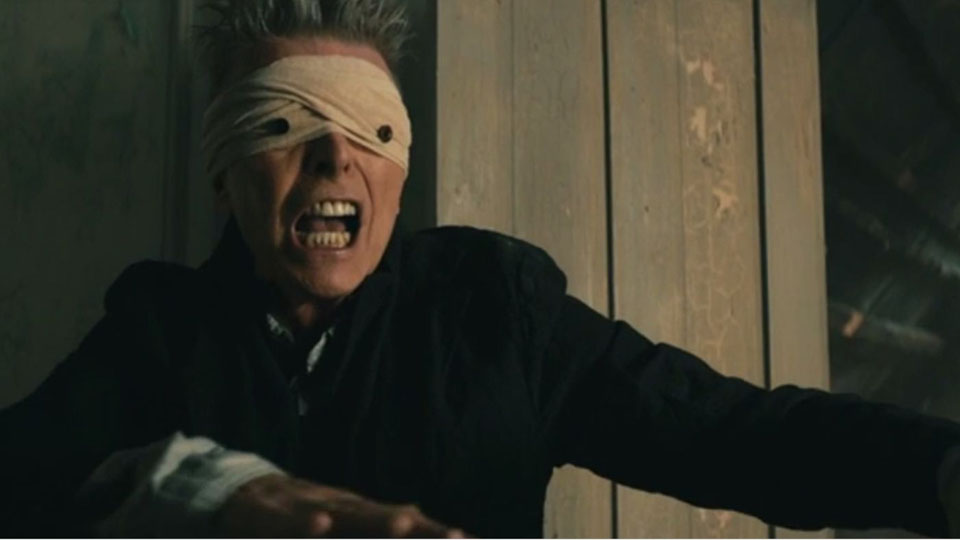
By Zachary Landau | The Duquesne Duke

Bowie wears a cloth mask in the music video for “Lazarus,” one of the songs featured on “Blackstar.” The song deals with the theme of ressurection.
There’s no way to write this review without the hindsight of David Bowie’s sudden death mystifying perceptions. For the longest time, a world without Bowie was almost impossible to imagine; he did not feel mortal, but rather like a gift sent from beyond our star to change the human experience. His impact on the music industry and pop culture cannot be understated, as Bowie’s unfettered boldness redefined what it meant to be an artist in this day and age.
That all said, his final album, “Blackstar,” is tricky to assess, as it feels dependent on the lineage of albums and personas leading up to its release to feel impactful. That is to say that the album is inherently tied into the image of Bowie that the audience has imagined for over four decades now. Without this background, “Blackstar” is still a stellar album but relies heavily on prior experiences with the artist to fully appreciate its scope.
Without question “Blackstar” is one of, if not the, most haunting album Bowie has ever released. Each track is dripping with moody chord progressions that complement the tired vocals and effectively puts listeners on-edge. Instead of the emotive and energetic tone employed before in, say, “Hunky Dory,” subdued vocals are utilized frequently and create much more meaningful impacts when allowed to soar into more expressive realms. While some of Bowie’s past albums meld into a surreal white noise, “Blackstar” demands to be heard thanks in no small part to this mastery he exerts over voice. Tainted with quaint sadness, the vocals possess a great degree of control over inflections that entices listeners from beginning to end.
The album’s overall tone provides the lens through which Bowie encourages his audience to see his career through. Indeed, “Blackstar” feels like the logical evolution of Bowie’s art, taking themes and motifs from past albums and elevating them to an almost divine status. In the titular track alone elements from “Heathen,” “’Heroes’,” “Station to Station,” and numerous other albums appear in altered forms, creating a familiar-yet-new experience that conjures up past eras while also surpassing them.
Highlights from the album include the aforementioned title track, as well as “Lazarus,” “Sue (Or In a Season of Crime),” “Girl Loves Me,” and “Dollar Days.” It is a testament to Bowie’s skills as a songwriter that none of these songs feel out of place on the album but also sound different from each other. “Sue,” for example, cries out as an amalgamation of Bowie’s “Scary Monsters (And Super Creeps)” and “Cactus” while “Dollar Days” invokes the somber parts of “Space Oddity” and “Soul Love.” All different manner of songs spanning over decades are brought together under the “Blackstar” banner in some of the most effective songwriting ever heard.
If there is one criticism to be levied against the album, however, it would be that it feels a bit on the short side. While 41 minutes is a decent length for a rock album, another song would have made the experience feel a bit more complete. Releasing an album nowadays with only seven tracks is a little strange.
The album’s obvious jazz influence is also rather bizarre. While Bowie has explored jazz in the past, he has never let it control so much of an album before. In fact, it feels more appropriate to call “Blackstar” a jazz album when considering tracks like “I Can’t Give Everything Away” and “Lazarus;” nearly every song has some distinguishing jazz moments, creating a sonic bridge between them that is not unwelcomed, just unexpected.
While not as wild as he was in the past, Bowie still provides a surreal experience with his latest and final album. Simultaneously a tribute to an entire career as well as an evolution of that career, “Blackstar” effectively nails a feeling of oblivion that dominates each track. While not as revolutionary or shocking as his past attempts, “Blackstar” is an excellent album that is best appreciated by the Bowie-devout.


